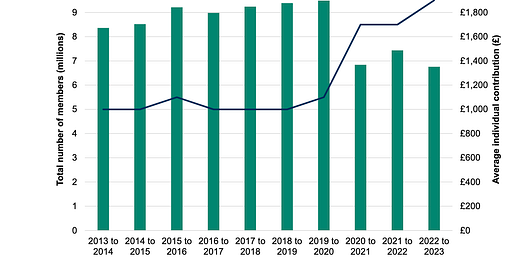Pensions: The easiest pay rise you’ll ever get
🔸 Plus: “Predatory marriage” 🔸 British nightclubs are dying 🔸 Analysts punish stocks more when the CEO is female 🔸
Your 2-minute guide to demystifying money and making you richer
The markets, year-to-date
S&P 500: 5,827.04 ⬇️ 1.67%
FTSE 100: 8,248.49 ⬆️ 0.92%
Bitcoin: $94,637.07 ⬆️ 1.23%
GBP to USD: $1.1905 ⬇️ 1.49%
GBP to EUR: €1.2207 ⬇️ 0.34%
(As of Friday market close.)
Pensions: The easiest pay rise you can ever give yourself
At Moneyin2 we have mentioned before that the single most lucrative thing you can do with your money is to enroll in your employer’s pension plan. (Or, if you are self-employed, open your own Self Invested Pension Plan (SIPP) which basically does the same thing.)
But Moneyin2 has never done a simple, plain-English explainer of why a workplace pension is such a big deal.
And why not using one is dumb.
So, here goes!
First, some context. Alarmingly few Brits take advantage of their employer’s pension plans. Although 80% of workers have one from a current or previous job, only 6.8 million people actually contributed to their pension in the most recent tax year. And that’s a decline from…





